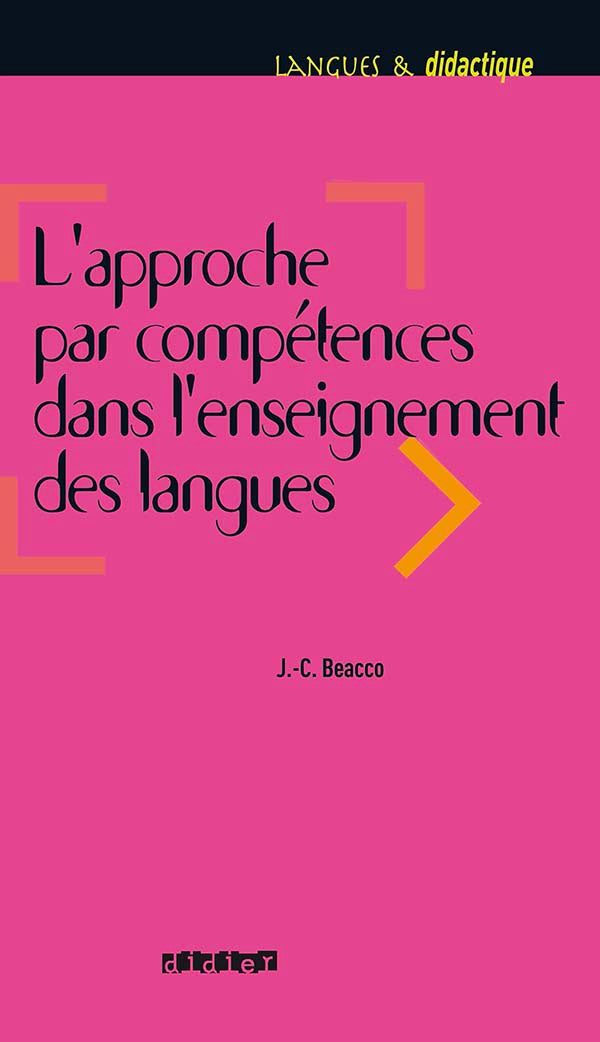Product Details
- Author : Jean-Claude Beacco
- Binding : PAPERBACK
- ISBN-10 : 227805810X
- ISBN-13 : 9782278058105
- Language : FRENCH
- Pages : 308
- Publisher : Didier
- Publishing Date : 11-07-2007
- Subtitle : BOOK
- Subject : FRENCH
- Weight : 400g
About Book
Enseigner à partir du CECRL
Cet ouvrage propose de décrire, de manière opérationnelle, des démarches méthodologiques pour organiser les enseignements des langues par compétences spécifiques, perspective adoptée de facto avec le CECRL.
Le Cadre européen commun de référence pour les langues (CECRL), instrument d’organisation de ces enseignements désormais incontournable, n’a pas pour objet de proposer une nouvelle méthodologie. Mais la place accordée à l’interaction, à la réception et à la production écrite/orale dans ses descripteurs, remet sur le devant de la scéne l’approche par compétences, stratégie d’enseignement qui est au coeur de l’approche communicative.
Ce petit traité de méthodologie à l’usage des jeunes générations reprend donc la question du début : définition de méthodologie d’enseignement et d’autres termes stratégiques (chap.1) et caractérisation de la méthodologie globaliste ordinaire (chap.2).
La réflexion centrale est consacrée à la détermination des composantes de la compétence à communiquer langagièrement (avec la composante discursive mobilisant les genres de discours), qui fondent l’approche par compétences [chap. 3 à 5) et dont le principe fondateur est que, si la connaissance d’une langue peut être analysée en compétences discursives distinctes, alors leur enseignement relève de démarches elles-mêmes distinctes. A partir de ce point de vue théorique, sont ensuite décrits de manière trés précise des éléments de guidage de l’enseignement de l’interaction orale (chap.6) et de la production/réception de textes(chap.7 et 8). L’articulation des compétences est analysée dans le chapitre final, car c’est elle qui commande la structure des unités concrètes d’enseignement et leur variabilité en fonction des cultures éducatives.
Car cet ouvrage n’est pas un manifeste pour une nouvelle "orthodidaxie" universaliste: il est animé par le seul souci d’élargir, si besoin est, le répertoire méthodologique des enseignants.
Translation
Teaching from the CEFR
This book proposes to describe, in an operational way, methodological approaches to organize the teaching of languages by specific skills, a perspective adopted de facto with the CEFR.
The Common European Framework of Reference for Languages (CEFRL), an instrument for organizing these lessons that is now essential, is not intended to propose a new methodology. But the place granted to interaction, to reception and to written/oral production in its descriptors, brings back to the fore the skills-based approach, a teaching strategy which is at the heart of the communicative approach.
This small treatise on methodology for the use of younger generations therefore takes up the question at the beginning: definition of teaching methodology and other strategic terms (chap.1) and characterization of ordinary globalist methodology (chap.2).
The central reflection is devoted to the determination of the components of the competence to communicate linguistically (with the discursive component mobilizing the genres of discourse), which are the basis of the competence-based approach [chap. 3 to 5) and whose founding principle is that, if the knowledge of a language can be analyzed into distinct discursive skills, then their teaching involves approaches that are themselves distinct. From this theoretical point of view, the elements guiding the teaching of oral interaction (chap.6) and the production/reception of texts (chap.7 and 8) are then described in a very precise manner. The articulation of competences is analyzed in the final chapter, because it is this which governs the structure of concrete teaching units and their variability according to educational cultures.
Because this work is not a manifesto for a new universalist "orthodidacticity": it is animated by the sole concern of expanding, if necessary, the methodological repertoire of teachers.













